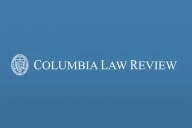You have /5 articles left.
Sign up for a free account or log in.
The Washington National Primate Research Center has long been a target for PETA’s activism.
PETA
The University of Washington’s Institutional Animal Care and Use Committee has won an early round in a battle with People for the Ethical Treatment of Animals, which is seeking to unmask the anonymous members of the committee’s board.
Though the fight is between PETA and UW’s IACUC, the committee isn’t suing the animal-rights organization; instead it filed suit against the university to prevent UW from complying with public records requests that would unveil members’ names.
By law, universities that receive federal money to conduct animal research must have an Institutional Animal Care and Use Committee. Oftentimes membership is confidential, but certain positions—such as the chair of the committee—may be publicly named.
Now a judge in Washington State has granted a preliminary injunction barring the release of the names of IACUC members. PETA is appealing the decision, arguing that the public has a right to know who is in charge of a facility that it says has an egregious history of abusing research animals. PETA also questions whether the IACUC includes members who are unaffiliated with the University of Washington, as the law requires, and hopes that public records will reveal the answer.
The Background
PETA has long been at odds with the Washington National Primate Research Center, arguing that the center has failed to protect animals in its care from unnecessary injuries and death. PETA accuses UW of operating with reckless disregard for research animals and leaving primates isolated, without food, water or social contact.
Recently PETA’s case got a boost when it gained a former UW IACUC member as one of its own: Lisa Jones-Engel, a longtime primatologist and biomedical researcher at UW, who has become a senior science adviser for PETA. She served on the IACUC from 2017 to 2019, an experience that she says changed her perspective and led to her resignation from UW in 2019.
Jones-Engel charges that the IACUC lacks a balance of voices. It is comprised largely of institutional employees and outside community members who have close ties to animal experimentation, she said, and is devoid of ethicists or others who could provide alternative viewpoints. That imbalance has fostered a committee that rubber-stamps everything that comes before it and fails to hold the primate center accountable for harming the animals in its care, Jones-Engel said.
“You can do anything you want to any animal that you want at the University of Washington,” Jones-Engel told Inside Higher Ed.
Her experience as an IACUC member ultimately led Jones-Engel to leave UW.
“Once you start peeling back the onion on this primate center, everything that could possibly be wrong is wrong,” Jones-Engel said. “The way the animals are housed, the unintended infections, the failure of leadership, the financial collapse, the lack of adequate staffing and NIH even taking the extraordinary step of restricting their funding. Of the seven remaining primate centers, it is truly the poster child for everything that is wrong when using primates in biomedical research.”
Jones-Engel was referring to controversies and criticisms the primate center has faced, including over a secretive breeding facility UW runs in Arizona that has been the subject of a National Institutes of Health investigation following reports of widespread disease.
UW researchers have countered that most of PETA’s claims are baseless and that inspection reports from the U.S. Department of Agriculture are publicly available online for anyone to see. UW has described reports about the breeding facility as “incomplete, meritless or misleading.”
On its website, UW describes its research as accelerating “the translation of basic discoveries into improved therapies and medical care.” Its work covers a broad spectrum of areas, such as AIDS-related research, reproductive and developmental sciences, and international outreach and conservation, just to name a few. Recent contributions include the development of the GPB510 coronavirus vaccine, which included immunizing two adult pigtail macaques as part of the research effort, according to the website.
The Legal Battle
Jane Sullivan, the current chair of UW’s IACUC, brought the lawsuit against the university in February; as the chair, Sullivan is a named member of the committee.
In court filings, Sullivan stated the IACUC “currently operates anonymously due to threats of harassment of Committee members by members of the public who oppose the use of animals in medical research.”
Unmasking the committee would put members at risk, Sullivan argues.
“When we learned that the University would be releasing our names, IACUC members told me they were scared, not just for themselves but for their family members and pets. I want to do everything I can to support and protect our dedicated committee members as they do their important work,” Sullivan wrote in an emailed response to questions from Inside Higher Ed.
And the threat isn’t just from PETA; if members’ names are revealed, Sullivan worries about vigilantism.
“Kyle Rittenhouse, Pizza Gate, January 6th. If we are forced to release our names, it wouldn’t only be to PETA. Our names would be released to anyone who asked for them,” Sullivan wrote. “Including people who have just heard PETA falsely accuse us of torturing animals.”
A judge found Sullivan’s argument convincing enough to issue a preliminary injunction to prevent the release of names in late April. Now PETA is appealing that decision. Members of the organization argue that Sullivan’s claims—including that animal research opponents have tried to intimidate researchers and kidnap their pets—are easily disproven and don’t warrant protection from disclosure.
“We’ve investigated each and every example that they’ve cited in support of the argument that they face a deluge of harassment and intimidation, and what we found, in each instance, is that they all fall apart with the slightest scrutiny,” said Asher Smith, director of litigation at PETA.
The issue, said Smith, isn’t harassment but rather accountability for the UW IACUC.
“What seems to be the case here is that they don’t want to hear any First Amendment–protected speech that makes them uncomfortable, but that’s not the law. There seem to be no actual threats or intimidation or harassment that they can point to,” Smith said.
But the lawyer representing Sullivan and unnamed IACUC members associated with the case argues that the court clearly considered the threats of harassment to be real.
“In issuing a preliminary injunction, the U.S. District Court found that the IACUC members have shown they’re likely to be harassed if their names are disclosed, and they may have First Amendment protections against disclosure under Washington’s Public Records Act,” said Darwin Roberts, attorney for Sullivan and other anonymous plaintiffs on the IACUC. “We hope the court will go on to permanently bar the disclosure of this information and that this case will help protect anyone who faces improper harassment as a result of public records requests.”
UW, for its part, has said it “will continue to adhere to the legal guidance set forth by the court.”
Ripple Effects for Animal Research
Outside organizations in the biomedical research world have rallied to the defense of UW’s IACUC members, supporting the decision to block the release of their names and arguing that scientists face threats for work that they deem vitally important.
Matthew R. Bailey, president of the National Association for Biomedical Research, praised the court’s decision to keep the names of IACUC members confidential.
“Animal extremist groups have a reprehensible history of running intimidation and harassment campaigns against those involved in biomedical research with animals. Members of the science community should not have to go to work every day with a target painted on their backs and the Court’s decision is a positive step in the right direction,” Bailey said in a late April statement.
“The threat to health researchers across this country and around the world is very real and unfortunately growing,” Paula Clifford, executive director of the biomedical research advocacy group Americans for Medical Progress, said in a statement following the preliminary injunction.
Clifford added that “scientists who conduct necessary and beneficial research in animals have been longtime targets of harassment, menacing comments and even threats. Now, COVID-19 researchers and public health officials who seek to control the pandemic are facing these very same issues. And the tactics remain consistent. They include threats of physical harm, harassment at home or at work and even death wishes and death threats.”
Though PETA is appealing the preliminary injunction shielding UW’s IACUC members from disclosure, a legal loss would bear similarities to a different court battle with another college. In January, the University of California, Davis, prevailed in a public-records lawsuit PETA brought seeking access to unpublished research data from the California National Primate Research Center. Specifically, PETA was seeking video recordings related to behavioral research on animals.
That lawsuit had been ongoing since February 2019.
Despite that setback, PETA is pushing ahead with its fight to reveal the names of UW’s IACUC. That battle is part of a larger war against animal research, and for Jones-Engel, a personal mission to shut down all U.S. primate research centers.
She describes “the use of animals as biomedical models” as “an antiquated science,” arguing that there are better research methods, such as 3-D-printed human tissue and organs on chips that offer better and more ethical alternatives to experimenting on primates and other animals.
After a career spent working with primates, Jones-Engel said it was ultimately the abuses she witnessed as part of the IACUC that turned her to PETA’s side. Now, regardless of what happens in court with her former employer, Jones-Engel has her eyes on the bigger fight: she wants to see all such primate research facilities closed.
“It wasn’t until I was so deeply embedded in Washington National Primate Research Center, and working with the other primate centers, that I realized that failings of the science are so critical, so fundamental, that there is absolutely nothing that can be done to redeem the system,” Jones-Engel said.








